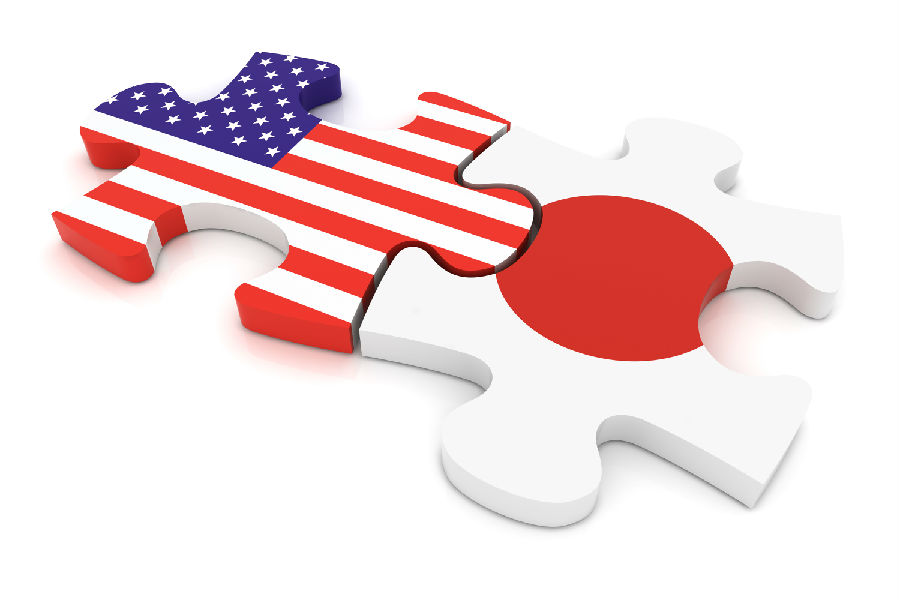(单词翻译:单击)
听力文本
Welcome to THE MAKING OF A NATION – American history in VOA Special English. I'm Steve Ember. This week, we continue our series of "Time Capsules." Each program will explore another facet, or decade, or period of America in the twentieth century. Last week, we discussed the Art and Culture that energized artists and writers during the difficult years of the Great Depression. This week, we'll look backward, to the beginning of the nineteen twenties – the Jazz Age, flapper, silent movies, more automobiles on the streets...
President Warren Harding's campaign of a Return to Normalcy after the First World War, the fall of Wall Street that led to the economic depression, Presidents Coolidge, Hoover, and Franklin Roosevelt and how they – and Americans – coped with the crisis. And we'll look ahead to the United States entry into a second world war as a result of the Japanese invasion of Pearl Harbor in December, nineteen forty-one. And all the years in between. It can only be a synopsis of these two event-filled decades, but we'll hope to give you a feeling for America between the two world wars – the companion story to last week's program in our Summer American Time Capsule Series. History is usually a process of slow change. However, certain events also can change the course of history. Napoleon's defeat at Waterloo was such an event. So was the first airplane flight by the Wright brothers. Or the meeting between the Spanish explorer Cortez and the Aztec king Montezuma.
All these events were moments that changed history. And so it was, too, with the Japanese attack on Pearl Harbor on December seventh, nineteen forty-one. "We interrupt this program to bring you a special news bulletin. The Japanese have attacked Pearl Harbor, Hawaii, by air, President Roosevelt has just announced..."A Japanese attack upon Pearl Harbor naturally would mean war. Such an attack would naturally bring a counterattack. And hostilities of this kind would naturally mean that the president would ask Congress for a declaration of war." The surprise attack on America's large naval base in Hawaii was a great military success for Japan. However, the attack on Pearl Harbor had more than a military meaning. The attack would force Americans to enter World War Two. More importantly, it would also make them better recognize their position as one of the most powerful nations in the world. In future weeks, we will discuss the military and political events of World War Two. But today, we look back at the years before the United States entered that war.

The period between the end of World War One and the attack on Pearl Harbor lasted only twenty-three years, from nineteen eighteen to nineteen forty-one. But those years were filled with important changes in American politics, culture and traditions. We start our review of these years with politics. In nineteen twenty, Americans elected Republican Warren Harding to the presidency. The voters were tired of the progressive policies of Democratic president Woodrow Wilson. They were especially tired of Wilson's desire for the United States to play an active role in the new League of Nations. Harding was a conservative Republican. And so were the two presidents who followed him, Calvin Coolidge and Herbert Hoover. All three of these presidents generally followed conservative economic policies. And they did not take an active part in world affairs. The change happened mainly because of economic troubles. "The country needs every ounce of its energy to restore itself." The nineteen twenties were a time of growth and business strength. President Calvin Coolidge said during his term that the "chief business of the American people is business." This generally was the same belief of the other Republican presidents during the period, Warren Harding and Herbert Hoover.
There was a good reason for this. The economy expanded greatly during the nineteen twenties. Many Americans made a great deal of money on the stock market. And wages for workers increased as well. However, economic growth ended suddenly with the stock market crash of October nineteen twenty-nine. In that month, the stocks for many leading companies fell sharply. And they continued to fall in the months that followed. Many Americans lost great amounts of money. And the public at large lost faith in the economy. Soon, the economy was in ruins, and businesses were closing their doors. President Hoover tried to solve the crisis. But he was not willing to take the strong actions that were needed to end it. As time passed, many Americans began to blame Hoover for the terrible economic depression.
重点解析
1.lead to 导致;引起
A lack of prudence may lead to financial problems.
不够谨慎可能会导致财政上出现问题。
2.as a result of 由于;作为……的结果
Her hair started falling out as a result of radiation treatment.
由于放疗,她开始掉头发。
3.be tired of 厌烦;厌倦
You must be tired of waiting for me.
你一定等得不耐烦了吧。
4.lose faith in b对……失去信心;不再信任
She began to lose faith in herself.
她开始对自己丧失信心。
参考译文
欢迎收听VOA慢速英语之建国史话节目,我是史蒂夫·恩伯。本周,我们继续“时间胶囊”系列节目,每期节目都将探索美国在20世纪的一个方面,或十年,或一个时期。上周,我们讨论了在大萧条的艰难岁月中,激发艺术家和作家活力的艺术和文化。本周,我们将回顾20世纪20年代初期,爵士乐时代、新潮女郎、无声电影,街道上更多的汽车等等。
第一次世界大战后,沃伦·哈丁总统发起了回归正常的运动,导致经济萧条的华尔街垮台,柯立芝总统、胡佛总统和富兰克林·罗斯福总统,以及他们和美国人民如何应对这场危机。我们要看一下美国因1941年12月日本入侵珍珠港,而加入二战,以及其间的岁月。这只是事端多发的二十年的一个概要,但我们希望让你了解两次世界大战之间的美国,这是上周《夏季美国时间胶囊》系列节目的姊妹篇。历史通常是一个缓慢变化的过程。然而,某些事件也能改变历史进程。拿破仑落陷滑铁卢就是这样的事件,莱特兄弟的第一次乘飞机飞行也是如此,亦或是西班牙探险家科尔特斯和阿兹特克国王蒙特祖马的会面。
所有这些事件都是改变历史的时刻。1941年12月7日,日本袭击珍珠港也是如此。“我们中断节目,带来一条特别的新闻简报。罗斯福总统刚刚宣布,日本已经空袭了夏威夷的珍珠港......“日本进攻珍珠港自然意味着战争,这样的攻击自然会带来反击。而这种敌对行动,自然意味着总统会要求国会宣战。”对美国夏威夷大型海军基地的突袭,对日本来说是一次巨大的军事成功。然而,对珍珠港的袭击不仅具有军事意义。这次袭击将迫使美国参加二战。更重要的是,这也将使它们更好地认识到自己是世界强国的地位。在未来几周,我们将讨论二战的军事和政治事件。今天,我们回顾美国参战前的数年。
从一战结束到偷袭珍珠港的这段时间只持续了23年,即从1918年到1941年。但那几年间,美国政治、文化和传统都发生了重大变化。我们从政治方面开始进行回顾。1920年,美国人选举共和党人沃伦·哈丁为总统。选民们厌倦了民主党总统伍德罗·威尔逊的进步政策,他们尤其厌倦威尔逊希望美国在新的国际联盟中发挥积极作用的愿望。哈丁是位保守的共和党人,紧随其后的两位总统卡尔文·柯立芝和赫伯特·胡佛也是如此。这三位总统一般都遵循保守的经济政策,他们没有积极参与世界事务。这种变化主要是因为经济方面遇到的困难。“国家需要竭尽全力使自己复原。”20世纪20年代是一个增长和展现商业实力的时期。卡尔文·柯立芝总统在其任期内曾说过“美国人民的首要任务就是商业”,这与当时的其他共和党总统沃伦·哈丁和赫伯特·胡佛抱持的理念一致。这是有原因的。20世纪20年代经济大幅度增长,许多美国人在股票市场上赚了很多钱,工人的工资也增加了。然而,随着1929年10月股市崩盘,经济增长戛然而止。在那个月,许多主要公司的股票大幅下跌。在接下来的数月里,股票继续下降。许多美国人损失了很多钱,公众对经济失去了信心。很快,经济陷入一片废墟,企业纷纷关门歇业。胡佛总统试图解决危机,但他不愿意采取必要的有力行动来结束这一局面。随着时间的推移,许多美国人开始把可怕的经济萧条归咎于胡佛。
译文为可可英语翻译,未经授权请勿转载!


